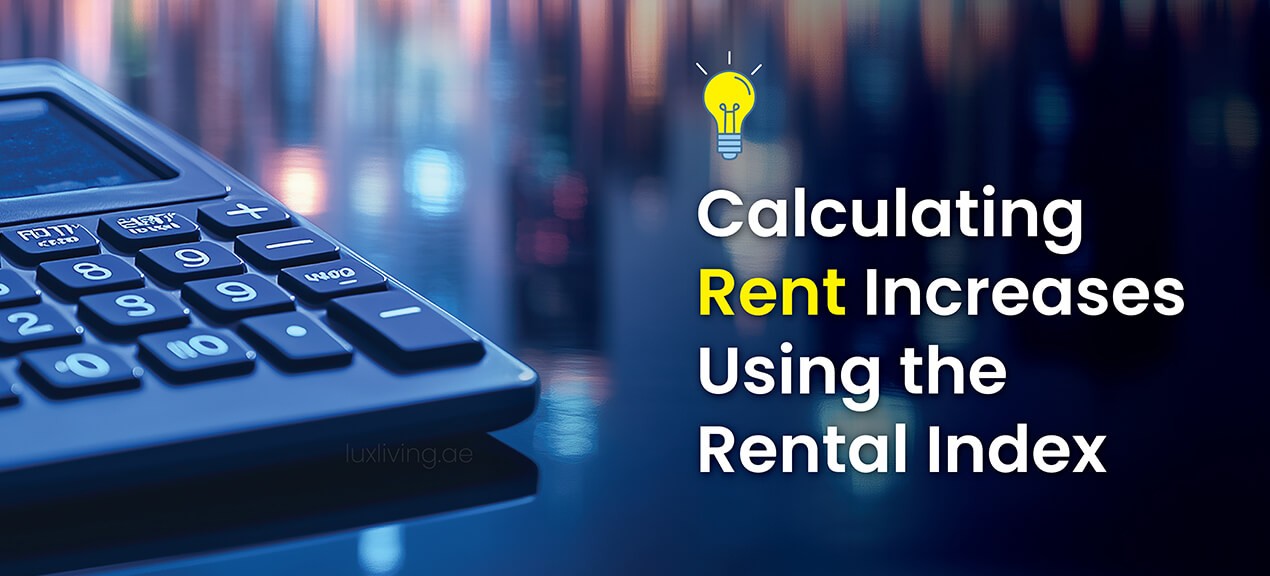
Understanding the rental market in Dubai can be challenging, whether you’re a tenant or a landlord. However, properly comprehending some elementary rules and regulations, such as the Rental Index and 90 days rental increase notice period, can make the process smoother. These factors are important in determining rent adjustments and ensuring a fair tenant-landlord relationship. Let’s understand all these laws deeply and why they’re important.
What is the Dubai Rental Index?
In Dubai, the rental prices of properties are guided by the Rental Index, a tool created by the Real Estate Regulatory Authority (RERA). Introduced in Law No. 1 of 2009, this index aims to regulate and guide rental values across different regions of Dubai. It’s updated periodically and is a critical tool for both tenants and landlords when negotiating rental prices or resolving disputes.
The Rental Index categorizes properties based on location, type, and use (residential, commercial, or industrial). It offers a transparent system that ensures fair pricing. This law helps landlords determine a competitive rent, while tenants can ensure they pay the market rate.

How Does the Dubai Rental Index Work?
The Rental Index covers all areas of Dubai, with properties grouped into regions. Each region has specific rent ranges that reflect the property’s minimum, maximum, and average rental values. The idea behind the index is to provide a reliable benchmark, helping to control rent hikes and maintain market stability.
For example, if a tenant believes their rent increase is too high. They can refer to the Rental Index to check whether the new rate aligns with the average rental value of similar properties in the same area.
Additionally, Dubai provides an easy-to-use Rent Increase Calculator, available on the official Dubai Land Department website. You can quickly determine the legally allowed rent increase by entering details like your current rent and property location.
The Role of the 90 Days Rental Increase Notice Period
Dubai’s rental laws are not just about prices; they also regulate how changes in the rental agreement, like a rent increase or contract terms, are communicated. This is where the 90 days rental increase notice period comes in.
According to Article 14 of Law No. 26, both the landlord and the tenant must give a written notice at least 90 days before the end of the tenancy contract if they want to make any changes to the contract. This could include a rent increase, amendments to terms, or even a request for non-renewal.
For example, if a landlord plans to increase the rent, they must notify the tenant 90 days before the contract ends. Likewise, if a tenant wishes to move out or negotiate new terms, they should provide the landlord with the same advance notice.

Why the 90 Days Rental Increase Notice is Important
The 90 days notice rule provides a buffer period, giving both parties ample time to consider any proposed changes and make necessary adjustments. It creates transparency, preventing last-minute surprises or disputes. If either the tenant or landlord fails to issue the Notice on time, the terms of the current contract (including the rent) remain in place for the following year.
This rule offers tenants peace of mind, knowing they won’t face sudden rent hikes. It also gives landlords enough time to plan for new rental rates or find new tenants if needed.
Additionally, suppose the landlord fails to provide the required Notice within the 90 days. In that case, the tenant has the right to reject any rent increase, even if the rental index suggests an increase. To avoid such situations, it is advisable for landlords to begin negotiating rental increases at least 100 days in advance. Otherwise, the tenant reserves the right to refuse the proposed rent hike.

Calculating Rent Increases Using the Rental Index
Rent adjustments in Dubai are closely tied to the Rental Index. Dubai’s rental laws set strict guidelines for how much a landlord can increase rent. This depends on how the current rent compares to the average market value listed in the index.
Here’s a breakdown of permitted increases based on the rental value:
- 0% increase if the current rent is 10% below or at market value.
- 5% increase if the current rent is 11-20% below market value.
- 10% increase if the current rent is 21-30% below market value.
- 15% increase if the current rent is 31-40% below market value.
- 20% increase if the current rent is more than 40% below market value.
Example of calculating the increase in property rent rate in Dubai according to the fees:
- Average rent in the official index = AED 80,000
- The current rate stated in the lease contract = AED 60,000
Calculating the decrease in rent below the average rent in the official index:
80,000−60,000/80,000 × 100
Decrease in rent below the average rent in the official index = 25%
Upon referral to the cases stated in the Decree, the rate in this case will be from 21-30%, which allows an increase of 10%.
- Increase in rent = 60,000 × 10% = AED 6,000
- Rent after increase: 60,000 + 6,000 = AED 66,000

Final Thoughts: Staying Informed to Avoid Surprises
In a dynamic real estate market like Dubai’s, tenants and landlords must stay informed about rental laws. The Rental Index and 90-day notice rule provide clarity and security for both parties. They help ensure fairness and prevent sudden financial shocks. Tenants can refer to the Rental Index to verify rent hikes, while landlords can use it to justify reasonable increases.
By understanding how these rules work, you can confidently navigate Dubai’s rental law. Whether you’re renewing a lease, negotiating rent, or planning to move.
Visit our website to stay updated with the latest real estate laws, market trends, and property listings. We assist you every step of the way, from finding your desired property to understanding the legal aspects of renting or buying. Contact us now to explore a wealth of real estate information to cater all your needs.

